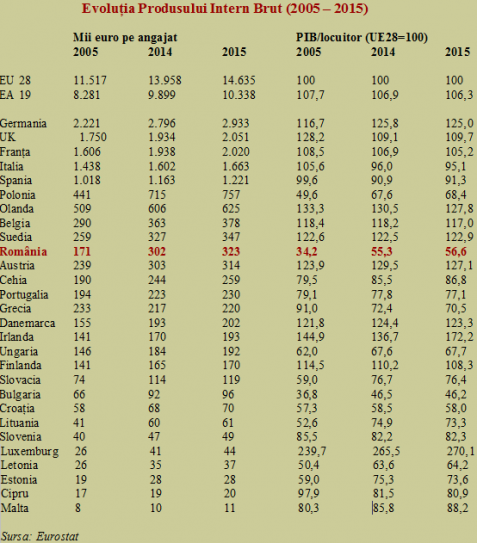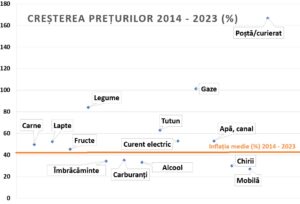 Romania became the tenth EU economy by purchasing power parity adjusted GDP, according to data published by Eurostat.
Romania became the tenth EU economy by purchasing power parity adjusted GDP, according to data published by Eurostat.
Over the past decade, our country surpassed, based on this indicator, countries like Greece (passing through a deep public debt crisis) and Portugal (systemically stagnant), but also states with relatively good evolution like the Czech Republic or, last year, Austria.
Even at a pinch, we became the country with the lowest living standard ranked in top 10 largest European economies that includes only Poland, of the former socialist states having a significantly lower level of development than the European average. Of course, size played an important role in both cases for this result, but changing the balance of forces should be emphasized.
It is also important to take into account that keeping prices at much lower levels as compared to those in the Western economies strongly boosted the economic outcome calculated in euro. We understand this way the importance of both price’s stability of products and services supplied on domestic market and postponement of Eurozone accession until a higher level of development is achieved.
The reason for delaying the moment for adopting the euro is that, afterwards, the safety valve offered by the exchange rate will disappear and the process of converging towards the European average prices will be faster and irreversible, regardless of how the economy will evolve and the government’s decisions on the management of public revenues.
*
- Evolution of GDP (2005-2015)
- Thousands of euro/employee
- GDP/inhabitant (UE28 = 100)
- Source: Eurostat
*
NOTE: This calculation method is equivalent to the adjustment of the economic power for the case that purchasing power of the single European currency would be equal in all EU countries.
We have the warnings of the strong economic setback of Greece and Cyprus (about 20% decrease of living standards as compared to the EU average), Spain (-10% as compared to the same average to which it was so close in 2005) or Portugal (whose position declined by only two percent, enough to be surpassed by the Czech Republic and almost have Slovakia or the Baltic countries catch up with the living standards).
Incidentally, keeping the national currency amid intense financial speculation proved no better either. In the British vote for leaving the EU, it also mattered the dramatic reduction of GDP / capita as compared to the EU average, although the country has managed to surpass France last year, as a result at the time of an overvalued pound as compared to the currency’s real power.
Outlooks
Sweden and Belgium are in front of us, at a recoverable advance on medium term, below the EUR 400 billion threshold and unlikely to evolve fast enough so that we cannot catch up with them at some point nearby the threshold. Basically, as our GDP per capita is now 56.6% of the EU average, we would surpass Sweden at some 61% and Belgium at 67% (about where the Poles are now).
Beyond a GDP growth rate of more than twice the EU average that is also foreseen for the coming years, the important element would be to maintain the macroeconomic balance towards the stability of prices (read maintaining inflation close to the target of 2.5%, plus / minus 1%, set by the central bank) and exchange rates (be aware of the populist extravagances like loan conversion at historical exchange rate).
Interestingly, given the Britain’s intention to leave the EU, there is something looming for the next decade that seemed a few years ago (when we were still the 14th in the ranking of the European economies) just a statement of a Prime Minister, the way of what the English call „wishful thinking”: to get where we should be by geographical area and population – the seventh EU country.










